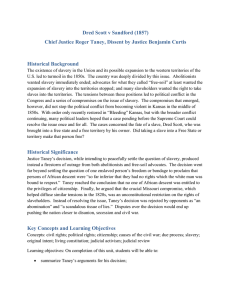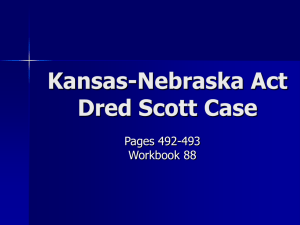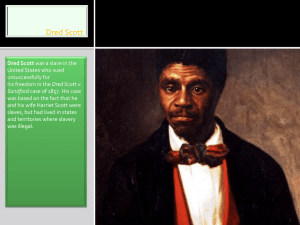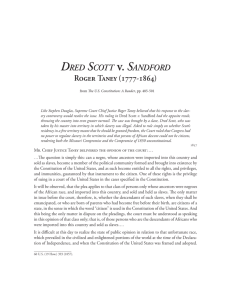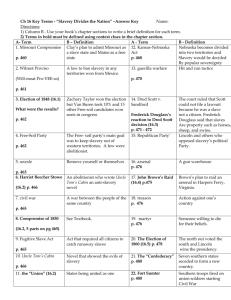--
advertisement
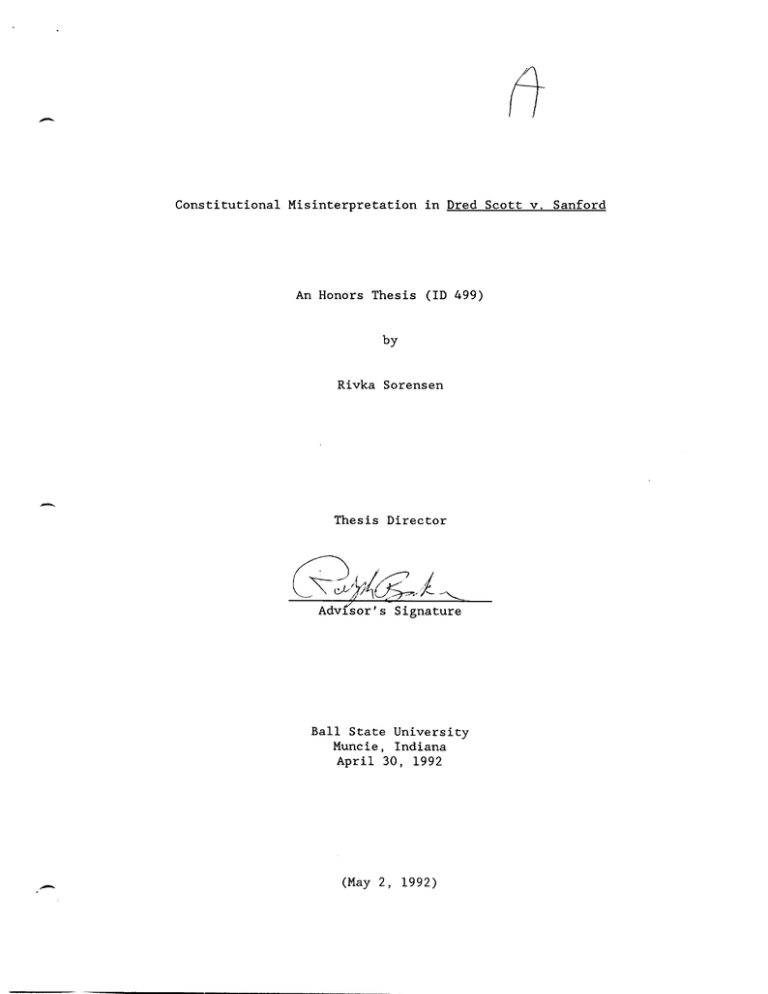
-Constitutional Misinterpretation in Dred Scott v. Sanford An Honors Thesis (ID 499) by Rivka Sorensen Thesis Director Adv~r's Signature Ball State University Muncie, Indiana April 30, 1992 ,- (May 2, 1992) Sorcl l I !;'e~ .- '- Ie ( ~~ '2::: ~/' ABSTRACT This thesis is an examination of one of the worst decisions made in the history of the Supreme Court, the decision in Dred Scott v. Sanford. First, the background of the case and its antecedents are described. Second, an analysis of the arguments that led to the disastrous decision are presented. Finally, it is demonstrated how the decision in this case is based on misinterpretations of the Constitution . .- - Article III, section created the highest Supreme Court. 1 court of the in this United states country, constitution the united states For years, from 1789 to 1803, the Court had no real power and evoked little respect from the population. This all changed with the 1803 decision in Marbury v. Madison, written by Chief Justice Marshall. This decision empowered the Court with the right of judicial review over acts of Congress. The Court now had the power to strike down "any official action based upon a law, and any other action by a public official that it deems -- upon careful reflection and in the line with the taught tradition of the law and judicial restraint -- to be in conflict with the Constitution," (Abraham, 1977). This ability saved the Supreme Court from remaining a relatively powerless appendage of the government. For the rest of the Marshall Era (1801-1835), the Court was viewed as an important and powerful branch of the government. It "defined and strengthened the young nation, guarding the federal government against the state goverments," (Abraham, 1977). Justice came Roger B. Taney. Following John Marshall as Chief "From 1836-1864 Chief Justice Taney's Court sought, in a variety of ways, to redress the balance ... in favor of the states, while continuing to defend the ownership of land and slaves," (Abraham, 1977). During Taney's reign in office, the public once again lost its respect for the Supreme Court. "Under the progressive genius of this new judicial administration we can see the whole fair system of the Constitution beginning to dissolve like the baseless fabric of a vision," (McCloskey, 1960). The reason for this loss of respect is the decision in the 1856 - Dred scott case. Rendered by Chief Justice Taney, this opinion has been referred to as the worst Supreme Court decision of all time. In order to understand the reasoning that led up to this disastrous decision it is necessary to look at the case itself. Dred Scott, Virginia. a When Mr. slave, was Blow died, the property of Peter Blow of his daughter sold Scott to an assistant surgeon in the Army, Dr. John Emerson. When Dr. Emerson was ordered to duty in Illinois in 1834, Scott went with him to this free state. In 1836, Dr. Emerson was transferred to a fort in the Wisconsin Territory. At this time the Wisconsin Territory was in the northern part of the Louisiana Territory. In 1820, the Missouri Compromise had prohibited the practice of slavery in the Louisiana Territory north of Missouri. In all, Scott lived in either free states or territories for approximately five years. In that time he married and had two children, one was born in free territory. slaves. When Dr. Emerson died in 1843, his widow inherited his A few years later she left for New York and did not take the Scotts with her. Mrs. Emerson left the Scotts with the sons of Scott's original owner, Peter Blow. Henry and Taylor Blow were opponents of slavery. Henry, a lawyer, was a member of the Whig Party which actively opposed the growth of slavery into the territories. suit to have Scott declared free. In 1846, Henry financed a The original lawsuit was filed in the Missouri courts and claimed that Scott had become free when he accompanied his master to Illinois and the Wisconsin Territory. It was also claimed that his freedom could not be taken away again simply because he returned to Missouri, a slave state. Henry - Blow's goal with this suit, was to undermine the spread of slavery to the territories. In 1850, the jury decided in favor of Scott. On appeal the case went to the Missouri Supreme Court which, in 1852, ruled that when Scott reentered Missouri he again became a slave. In 1853, Mrs. Emerson transferred title of the Scotts to her brother, John Sanford of New York. A new lawsuit was brought in federal III, court Constitution based on gives that Article section courts federal 2(1) of the jurisdiction in controversies "between citizens of different States. 1I This time the Scotts sued for their freedom and for damages in the amount of $16,500 incurred for being wrongfully held as slaves. The verdict of the all-white jury was for Mr. Sanford. When Dred Scott v. Sanford made it to the Supreme Court, it had to be argued two separate times. The first time the case was argued, the court could not decide the question of whether Scott was a citizen of the United states and therefore entitled to sue in federal court. It was a year before the Court announced its 7-2 decision against opinion. The Court ruled that Congress could not prohibit slavery in territories the unconstitutional. Scott. and Each thus of the the nine justices wrote Missouri Compromise an was Taney wrote that slaves and their descendants could not become and never had been considered citizens of the United States. Henry Blow freed the Scotts in 1857 and Dred Scott died after being a free man for just over one year. What led the Supreme Court to corne to decision? such a disastrous Some believe that in his opinion Justice Taney was - attempting, "to extricate both the federal courts and Congress from the slavery controversy," (Shapiro, 1974), while others state it in a slightly different manner that Taney, "tried to secure once and for all the place of slavery under the Constitution,1I Kaufman, 1988). (Goldwin & In either case, the Supreme Court unwisely elected to "settle the slavery question by judicial decree," 1974) . The holding that the Missouri (Shapiro, Compromise of 1820 was unconstitutional was only the second time in history that the Court held an act of Congress unconstitutional. The Court was asked to decide the issue of whether a black slave, the descendant of such a slave, rights and privileges Constitution. guaranteed to is entitled to all the u.S. citizens by the To this, Chief Justice Taney emphatically replied that slaves and their descendants had never been intended to be considered as citizens and were therefore not entitled to the privileges reserved for citizens of the United States. He held that and the writers of the Declaration of Independence the Constitution "simply did not regard Negroes as included among the 'all men' who are are 'created equal, "' (Goldwin & Kaufman, 1988). Negroes, according to Taney, IIhad for more than a century before been regarded as beings of an inferior order; and altogether unfit to associate with the white race, either in social or political relations; and so far inferior, that they had no rights which the white man was bound to respect; and that the negro might justly and lawfully be reduced Kaufman, 1988). to slavery for his benefit, II (Goldwin & This is how Taney resolves any conflict that would point to the hypocrisy between the actions of the Founders, in - being themselves slaveowners, and their fundamental belief in the equality of all men. If slaves or their descendants were not considered to be men then depriving them of their basic rights could not be considered unjust or hypocritical. Taney went on to state that: they were at that time considered as a subordinate and inferior beings ... and had no rights or privileges but such as those who held power and the Government might choose to grant them (Corsi & Lippman, 1985). To support his contentions that blacks were considered a separate race by the Founders, Constitution. - Taney points to several clauses in the First, Article 1, section 9(1) states that: The migration or importation of such persons as any of the states now existing shall think proper to admit, shall not be prohibited by the Congress prior to the year one thousand eight hundred and eight, but a tax or duty may be imposed on such importation, not exceeding ten dollars for each person. Second, Article IV, section 3 states that: No person held to service or labor in one state, under the laws thereof, escaping into another, shall, in consequence of any law or regulation therein, be discharged from such service or labor, but shall be delivered up on claim of the party to whom such service or labor may be due. Taney felt that these two clauses conclusively demonstrate that neither slaves nor their descendants were meant to be represented in the rest of the Constitution. Also, he believed that these two clauses showed that they were not intended to have the rights and privileges that are associated with citizenship in this country. Based on these conclusions, the Court found that since Negroes were not citizens of the united States they had no right to sue in federal courts, jurisdiction. thus the case was to be dismissed for want of .- Having solved the issue of whether or not Dred Scott, or any slave or his/her descendant, could bring suit in a federal court, the Supreme Court could have and probably should have stopped here. Rather than extricating the federal courts from the slavery controversy it seemed that the Taney Court had managed to secure a place for slavery under the Constitution. For some reason, the Court felt compelled to continue and decide the issue of "whether Congress was authorized to pass the Missouri Compromise under any of the powers granted it by the Constitution," (Corsi & Lippman, 1985). In this case this question was no longer relevant because it had already been decided that Dred Scott could not bring this suit. Also, the Missouri Compromise being decided upon had been repealed in 1850. Nevertheless, this issue was addressed by the Court. The Missouri Compromise declared that slavery and involuntary servitude, unless as punishment for a crime, were prohibited in the part of the Louisiana Territory that lies north of 36 30'. Taney holds that the powers of Congress are strictlty outlined in the Constitution and that whenever a new territory enters the united States, Congress must act within these given powers when dealing with this territory. Taney notes the Fifth Amendment to the Constitution which states that no person shall "be deprived of life, liberty, or property, without due process of law." He then goes on to state that: and act of Congress which deprives a citizen of the united states of his liberty or property, merely because he came himself or brought his property into a particular Territory of the United States, and who had committed no offense against the laws, could hardly be dignified with the name due process of law (Corsi & - Lippman, 1985). Taney claimed that there is no distinction between an individual's property in a slave and other property owned by that individual. Taney writes that "no word can be found in the constitution which entitles property of that kind to less protection than property of any other description," Taney, "the right of (Corsi Lippman, & property in a 1985). slave is According to distinctly and expressly affirmed in the Constitution," (Corsi & Lippman, 1985). Based on these contentions, the Court decided Congress had no right within the Constitution to place any prohibitions of this kind on this territory and that the Missouri Compromise must therefore be void. The aforementioned contentions and interpretations were rendered for the Court by Chief Justice Taney in his opinion. I plan to present arguments to show the flaws in some of Taney's interpretations that led to the one the worst rendered in the history of the Supreme Court. decisions ever It may have been intended for this decision to stall the inevitable or even quiet the discontent of the nation, instead it inflamed the country which soon became embroiled in a civil war that threatened to tear it apart. "Far from extinguishing the slavery controversy, they [the Taney Court] had fanned its flames and had, moreover, deeply endangered the security of the jUdicial arm of the government," (McCloskey, 1960). The Supreme Court need not have made any decision in this case because the issue of whether an individual was a slave or a freeman had already been decided in 1850. In Strader v. Graham it was - ruled that an individual's status was to be decided based on the laws of the state of domicile. In Dred Scott the Supreme Court of Missouri went against its own precedent. There were eight cases of precedent that had adhered to the priciple of "once free, always free," yet the Supreme Court of Missouri chose to ignore these cases. One such case is Rankin v. Lydia(1820), in which Lydia was taken to Indiana from Missouri by her master. She was later sold and her new master took her back to Missouri. She sued for her freedom claiming that her slave status had been "destroyed" in Indiana. The courts agreed that once she was free she could not be forced back into slavery just because she entered a slave state. In claiming that Negroes could not be citizens of the United States, Taney argued that at the time the Constitution was written - no Negroes were citizens of any states and could therefore be "forever excluded from U.S. citizenship" (Goldwin & Kaufman, 1988). However, in his dissenting opinion, Justice Curtis showed that free Negroes were citizens in many states at this time. privileges and immunities clause, Article IV, Thus, section the 2(1), guaranteed that "the citizens of each State shall be entitled to privileges and immunities of citizens in the several States." Through this clause it can be shown that an individual who is a citizen of one state is necessarily a citizen of the United States. Thus, a black citizen of one state should not feel threatened that if he/she were to travel to a slave state they could lose his/her freedom. Taney went on to argue that Negroes were never intended to be considered equal and were not even considered to be people, rather - they were merely thought of as property. This is a gross misinterpretation of the truth, in all the constitutional sections pertinent to slavery, slaves are always referred to as persons. In fact: The Founders understood quite clearly that Negroes, like men everywhere, were created equal and were endowed with unalienable rights. They did not say that all men were actually secured in the exercise of their rights or that they had the power to provide such security; but there was no doubt about the rights (Goldwin & Kaufman, 1988). This seems like it could be a Founders out of a loophole engineered to get the sticky situation, representation of the situation. however it is an accurate Today, we have freedom of speech, but that does not mean we have an absolute right to say anything at anytime. For example, yelling 'fire ' in a crowded theater would not be protected by free speech since it would present a clear and present danger to those occupying the theater. We have these rights yet are not allowed to exercise them to the extent that some might wish. A Mississippi judge stated that "because individuals may have been deprived of many of their rights by society, it does not follow that they have been deprived of all their rights," they are "still a human being and possess all those rights, of which he is not deprived by the positive provisions of the law," (Goldwin & Kaufman, 1988). Slaves were commonly deprived of their civil rights while being held accountable to, and protected by, criminal law. In the eyes of the law, slaves were regarded as persons capable of committing crimes and having crimes committed against them. - . Yes, blacks were looked down upon as inferior to whites, however, this does not justify slavery . Were the founders of our country incredible hypocrits, espousing the virtues of freedom and equality while enslaving and dehumanizing a people on the basis of their color? If looked at superficially, one might say that, yes, they were hypocrits. Taney resolved this issue by determining that slaves were only considered property, not persons and thus they had no rights that could be infringed upon. wrongdoing. Thus the Founders were absolved from any Taney came to the correct conclusion but for very wrong reasons, he misinterpreted the constitution in his assertion that slaves were only property. When the Supreme Court upheld the constitutionality of the Fugitive Slave Act of 1793 in Prigg v. Pennsylvania(1842), the opinion written by Justice Story stressed that slavery was "a mere creature of positive law and has no support - (Goldwin & Kaufman, 1988). in natural law," Basically, while slavery is protected by the law, "the presumption is always against slavery," (Goldwin & Kaufman, 1988). In limiting slavery, the government or courts would give the impression of confirming that slavery is justified. This they attempted to avoid. "It is the wrongness of slavery that makes it impossible to limit it," (Goldwin argued that the Consti tution & Kaufman, 1988). "distinctly acknowledged the right of property in a slave. and Taney expressly" However, the word "slave" is not mentioned once on the entire Constitution. The Founder knew that they would not be able to abolish slavery, the sentiment of the time would never have allowed it. everyone to join the new Union they concessions. Slavery is alluded to Constitution; Article I, section 9: were In order to get forced to make in three sections of the Article I, section 11, the - three-fifths clause and; clause. Article IV, section 2, the fugitive slave "None of the three [clauses] recognized slavery as having any legitimacy in federal law," (Goldwin and Kaufman, 1988). their limitations demise. on slavery they provided the tools In for its In Article I, section 9, it refers to the importation of slaves into the states in only "the states now existing" that "shall think proper to admit." Also, Congress is forbidden from prohibiting these states from engaging in this importation only until 1808. This clause implies that slavery can be regulated or forbidden in any new states that may be formed, or existing states in which the population does not favor slavery, and can be subject to any Congressional legislation after the year 1808. This provision should have upheld the constitutionality of the Missouri - Compromise since Congress is given the implied right to regulate slavery in Consti tution new territories was penned. If not existing slavery at was the time guaranteed by the the Constitution, why would a time limit be place upon how long it could be practiced without congressional interference? Obviously, interpreted correctly this is "not a guarantee of a right but a postponement of a power to prohibit," (Goldwin & Kaufman, 1988). It was hoped, or expected, by the Founders that after the allotted twenty years had passed, Congress would forbid the trading of slaves. More than Constitution anything that southern delegates. deal else, with most slavery of the are provisions concessions of the made to Nowhere is the term "slave" mentioned in the Constitution and the wording in reference to slavery is quite - ambiguous. It is clear that the Founders were not, as concluded by Taney, bestowing an undeniable right to property in slaves. Rather they were leaving the door open to eventual abolition of slavery. future regulation and the Not only were blacks people, but they also were citizens of states and thus, the united states. On the eve of the civil War Lincoln said, "As those fathers marked it, [slavery] so let it be again marked, extended," (Goldwin & Kaufman, 1988). as an evil not to be The Founders did what they could to confine slavery without legitimizing it. In the words of a Missouri judge, " Sound national policy required that the evil [slavery] should be restricted as much as possible. could, they did," (Goldwin & Kaufman, 1988). What they The misinterpretation of these actions by the Taney court in Dred scott v. Sanford - the public with little confidence in the Court. left Taney's biggest mistake had been "to imagine that a flaming political issue could be quenched by calling judicially," (McCloskey). it a 'legal' issue and it The time for the end of the oppression of slavery came and the Court did not yield. The lower courts had abandoned precedent in deciding the case and so, Supreme Court. deciding too, did the The Court need never have made a decision in this case had it sent it back to Missouri in accordance with Strader. Also, the Court violated one of its own basic rules when it went on to decide on an issue that it had not been asked to resolve in deciding that the Missouri Compromise was unconstitutional. This unfortunate case was only the second time in history that the power of judicial review had been excercised by the Supreme Court to - declare federal legislation unconstitutional. Without question - this case will live on in infamy in the hearts of all those who appreciate the interpretation. - Supreme Court and its power of constitutional -- References Abraham, H.J. (1977). Freedom and the Court: Liberties in the united states. civil Rights and New York: Oxford University Press. Abraham, H.J. (1977). The Judiciary: Governmental Process. Allyn & Bacon, Inc. Boston: Corsi, J.R. and Lippman, M.R. The Supreme Court in the (1985). Political Science Casebook. constitutional Law: Englewood Cliffs: A Prentice- Hall, Inc. Goldwin, R.A. and Kaufman, Consequences: Washington: The A., eds. (1988). Constitution, Slavery and Its Eguality, and Race. American Enterprise Institute for Public Policy Research. Joseph, J.D. (1987). Supreme Court. Black Mondays: Bethesda: McCloskey, R.G. (1960). Worst Decisions of the National Press. The American Supreme Court. Chicago: The University of Chicago Press. - Randall, J .G. (1963). Gloucester: Constitutional Problems Under Lincoln. University of Illinois Press. Shapiro, M. (1974). The Politics of constitutional Law. ,- Cambridge: swisher, C.B. Princeton: Winthrop Publishers, Inc. (1958) . Historic Decisions of the Supreme Court. D. Van Norstand Company, Inc.

